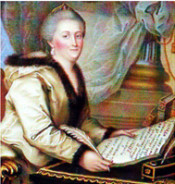
Catherine II published the Manifesto on the establishment of the Ulozheniye Commission and decrees on the order of deputies election
(14) 25 December, 1766 Empress Catherine II published the Manifesto on the establishment in Moscow of the Commission to compose a draft of the new Ulozheniye (Code), and decrees on the election of deputies to the Commission. The main objective of the Ulozheniye Commission was to prepare a common set of national laws relating to all aspects of life in the Russian society.
Ulozheniye Commission was a temporary collegial body, convened by Catherine II in order to create a new code of laws on the basis of the Sobornoye Ulozheniye (legal code) of 1649 and regulations which came into force after its publication. For the first time in Russian history, such a representative body combined broad social strata: nobles, citizens, public (personally free) peasants, Cossacks, and several other groups of population. A new set of laws was being developed by the deputies elected by people. In addition, each of them had to bring a paper stating "the needs and shortcomings", drawn up at the meeting of his electors. Each of the panels, the central governing bodies, also sent a deputy.
The first meeting of the Ulozheniye Commission was held in the Palace of the Facets in Moscow, and the next ones - in St. Petersburg, where the imperial court moved by that time. Catherine II closely followed the activities of the Commission, gave instructions for the course of its work. For members of the Commission Catherine II composed the "Nakaz" (“Instruction”) - a treatise of philosophical and legal character, which reflected the key issues of the state theory and policy, as well as the views of the Empress on future legislation and government system of Russia. For the first time in Russian history, the "Nakaz" laid down the principles of legal policy and legal system.
The Ulozheniye Commission was divided into special committees charged with specific problems. At meetings, the deputies were allowed to speak out on any issues of concern: as a result, during the meetings often unfolded sharp discussion about the rights of the nobility and merchants, and their relations, the situation of the peasantry. Some deputies proposed to ease the lot of the peasants. It was proposed to prohibit the increase of peasant dues in excess of the statutory level and even to establish a special panel, which would levy the peasants’ duties in favor of landlords. However, most members of the nobility started to defend their privileges and serfdom.
A large meeting of the Commission was disbanded in December 1768 due to break out of the Russian-Turkish war of 1768-1774. Private Commissions, formed to develop legislation on specific issues, operated until October 1771. The result of their efforts was the bills, used later for development of major legislative acts of the reign of Catherine the Great.
The end of functioning of the Ulozheniye Commission marked the completion of the first stage of reforms of Catherine II. Later, she noted: "The Ulozheniye Commission ... shed light and provided information regarding the whole empire, the people we are working with and whom we should care for."
Lit.: Бочкарёв В. Культурные запросы русского общества начала царствования Екатерины II по материалам законодательной комиссии // Русская старина. 1915. № 2; Кизеветтер А. А. Происхождение городских депутатских наказов в екатерининскую комиссию // Исторические очерки. М., 1912; Кудряшёв П. Отношение населения к выборам в екатерининскую комиссию // Вестник Европы. 1909. № 11; №12; Латкин В. Н. Законодательные комиссии в России в XVIII столетии. СПб., 1887; Мадариага де Исабель. Уложенная комиссия 1767 г. // Россия в эпоху Екатерины Великой. М., 2002; Недосекин В. И. Об изучении наказов в законодательную комиссию 1767 г. // Источниковедение отечественной истории: Сб. статей. М., 1980; Сергеевич В. Откуда неудачи екатерининской законодательной комиссии // Вестник Европы. 1878. № 1.
Based on the Presidential Library’s materials:
Catherine II (1729–1796) // The House of Romanov. The Zemsky Sobor of 1613: [digital collection];
Полное собрание законов Российской Империи. Собрание 1-е. СПб., 1765-1766. Т. 17 (1830). № 12801;
Полное собрание законов Российской Империи. Собрание 1-е. СПб., 1770-1774. Т. 19 (1830). № 13953;
Флоровский А. В. Состав Законодательной комиссии, 1767-74 гг. Одесса, 1915.

